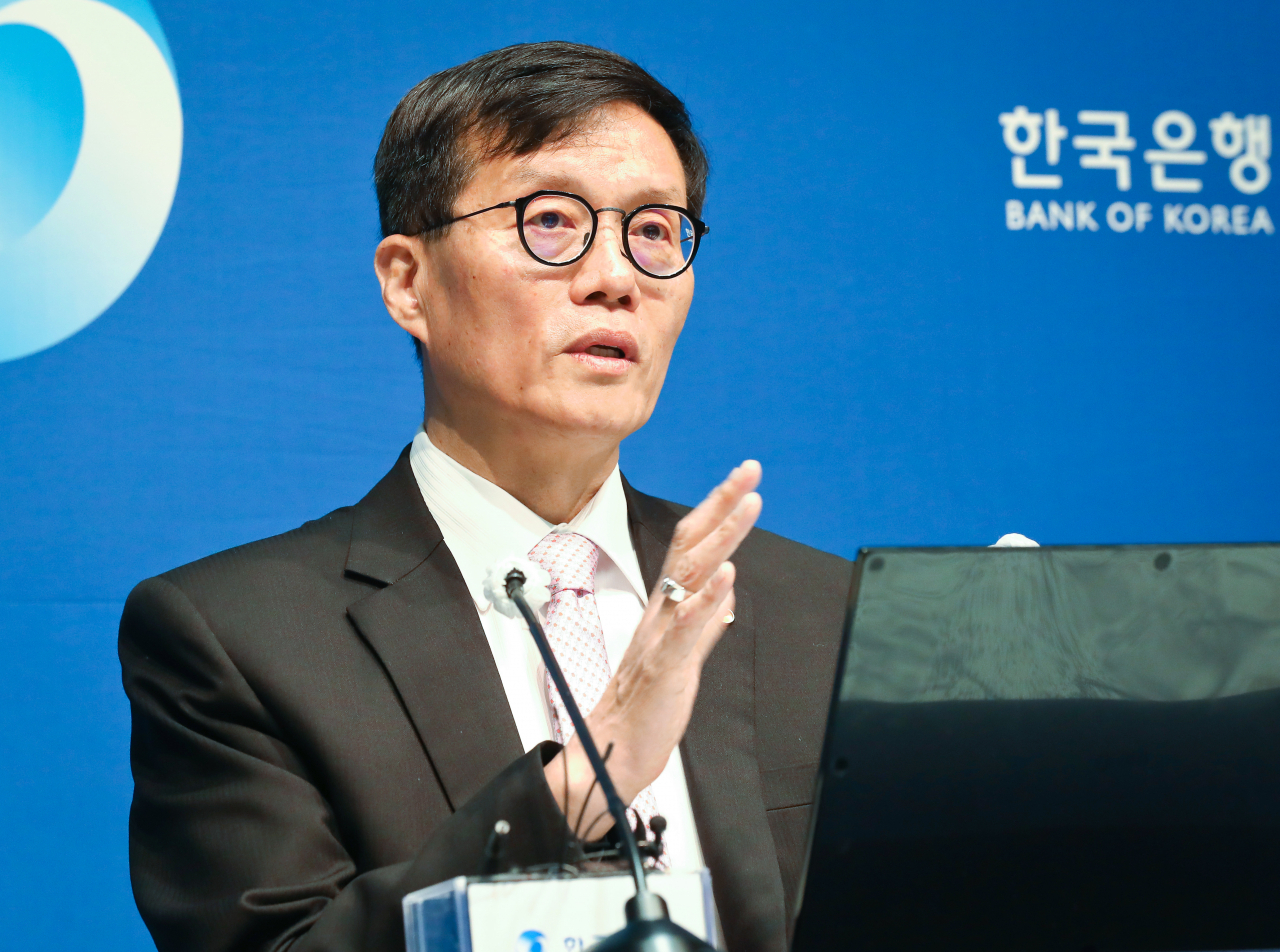BOK holds rate, wary of inflation's ‘last mile’
Korean won-US dollar exchange rate closes at 1,375.4 won, hitting 17-month high
By Im Eun-byelPublished : April 12, 2024 - 16:25

Nearing the “last mile” of its fight against rising prices, the Bank of Korea held the base rate at 3.5 percent for the 10th consecutive time Friday.
The monetary policy board of the central bank decided to maintain the rate through a unanimous vote, keeping the rate steady for more than a year since February 2023, BOK Gov. Rhee Chang-yong said at a press conference held shortly after the rate-setting decision.
“While the headline and core inflation moved in a nearly synchronized path, they are starting to play out differently,” Rhee said, further assessing how the current state of inflation in Korea differs from the US and Europe.
"The core inflation is slowing down as projected, but it is moving in a different direction from that of the headline inflation as prices of oil and agricultural products increase, raising the uncertainty of forecasting prices," he said.
Consumer prices rose by 3.1 percent in February and March in Korea, unable to move below 3 percent since reaching 2.8 percent in January. Core inflation slightly eased off from a 2.5 percent growth observed in January and February to 2.4 percent in March.
The unwavering inflation makes it more difficult for the BOK to loosen its grip on monetary policy.
On Wednesday, data showed US consumer prices accelerated to 3.5 percent growth on-year, making a larger-than-predicted jump. The price surge has cast further doubt as to whether the Federal Reserve will start cutting interest rates in June.
The CME FedWatch Tool showed a 75.8 percent probability for the Fed to maintain the rates at the current level between 5.25 percent to 5.5 percent in its June meeting, reflecting the dampened anticipation of a rate cut happening soon.
“The delay in the US’ pivot seems to be true,” Rhee said. But he added that Korea can exercise its monetary policy without relying on that of the US to a certain extent.
“It is difficult to (move the rate) separately with the US when it is on a rate hike cycle. But currently, the question lies in when the Fed will turn for a pivot, and how much of a rate cut it will deliver.”
Rhee assessed the decoupling of the policy rates has already begun as the US Fed gave its signal for a pivot at the end of last year.
“We have more power than in the past to execute our monetary policy based on domestic factors such as changes in the price growth,” he said.
But the dampened hopes of the US Fed’s pivot have strengthened the US greenback, devaluing the local currency. The won-dollar exchange rate closed at 1,375.4 won on Friday, up 11.3 won from the previous day’s closing at 1,364.1 won.
The rate has reached its 17-month high since November 2022 when the global aggressive monetary tightening was in its full reign.
Though the devaluing of the Korean won is connected to concerns about high inflation, Rhee highlighted Korea’s strong fundamentals.
“One of the most major differences from the past is the increase in net external assets. With the rise in overseas assets owned by entities such as the National Pension Service and retail investors, Korea’s foreign exchange market has evolved into that of a developed nation,” he said.
The market maintained the expectation that the BOK will start to bring down the base rate in the second half of this year.
“Assuming the domestic demand is maintained at the current level, Korea will go for a rate cut in the second half of this year if the European Central Bank brings the rate down in June," Kang Seung-won, analyst at NH Investment & Securities, said.
KB Securities analyst Lim Jae-kyun said Korea’s rate cut will likely come in early August.
"But there is the possibility the BOK's rate cut could be delayed to the fourth quarter or 2025, considering the path of inflation," he said.



















![[Today’s K-pop] Treasure to publish magazine for debut anniversary](http://res.heraldm.com/phpwas/restmb_idxmake.php?idx=642&simg=/content/image/2024/07/26/20240726050551_0.jpg&u=)